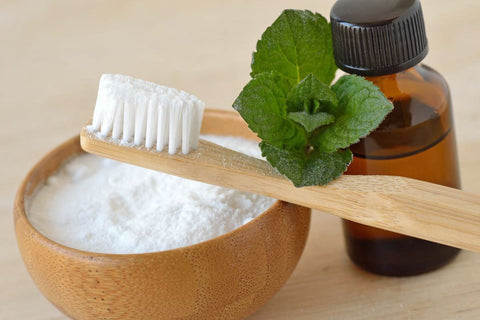Peppermint oil has a rich history of being lauded for its numerous health benefits over the centuries. Its natural properties, boasting anti-inflammatory and antimicrobial qualities, position it as a potential remedy for toothache relief and oral care. This blog will explore its various benefits for oral health and toothache relief.

With its analgesic and anti-inflammatory properties, peppermint oil has garnered attention in addressing toothache and oral health issues. Utilizing peppermint oil for teeth can be highly effective. Additionally, we will provide homemade DIY recipes of peppermint essential oil for teeth and guidance on how to incorporate peppermint oil into your dental care routine for the best results.
Peppermint Oil Benefits For Toothache
Peppermint oil has gained popularity for its potential benefits in alleviating toothache. This essential oil possesses natural properties like analgesic and anti-inflammatory qualities, making it a promising remedy for toothache relief and improved oral health. So, let's see the benefits of peppermint oil for toothache.
- Tooth Pain: Peppermint oil contains menthol, which has natural analgesic properties. When applied topically, especially on the affected area of a toothache, it can help numb the nerve endings and reduce pain sensations. The cooling effect of menthol provides a pleasant relief from the discomfort associated with toothache.
- Anti-inflammatory Action: Inflammation is often a common toothache component, leading to redness, swelling, and pain. Peppermint oil has anti-inflammatory properties that can help reduce the swelling in the affected area. The oil may alleviate some of the discomfort associated with toothache by inhibiting certain inflammatory pathways.

- Antibacterial Effects: Peppermint oil contains compounds like menthol and limonene, which have demonstrated antibacterial activity. When applied to the mouth, these properties can target and combat harmful bacteria contributing to toothache or other oral health issues. It can aid in maintaining oral hygiene and reduce the risk of further infections.
- Freshens Breath: Peppermint oil's strong, minty aroma makes it an effective natural breath freshener. Bad breath is often associated with oral health problems, and peppermint oil can help mask unpleasant odors in the mouth while also targeting the underlying bacteria that contribute to bad breath.
- Tooth Discomfort: Beyond its analgesic properties, peppermint oil can be soothing when applied to the affected area. The cooling and calming effects of menthol can temporarily ease the discomfort and sensitivity associated with toothaches.
How To Use Peppermint Essential Oil For Toothache?
To use peppermint oil for toothache relief, apply a few drops of diluted peppermint essential oil directly to the affected tooth or gum area using a cotton ball or swab. Alternatively, add a few drops to your regular toothpaste or mouthwash for added benefits. But if these methods doesn't interest you, here are a few simple recipes of peppermint oil for teeth.
1. Coconut Oil And Peppermint Oil DIY For Toothache
Combining coconut oil with peppermint oil can enhance its oral benefits. Oil pulling, where you swish the mixture in your mouth for a few minutes, may help improve oral hygiene and reduce toothache discomfort.

Ingredients:
- Virgin Coconut Oil - 1 Tablespoon
- Peppermint Essential Oil - 2 Drops
Directions:
Step 1: Place one tablespoon of coconut oil in a small microwave-safe bowl.
Step 2: Microwave the coconut oil for a few seconds until it turns liquid. Make sure not to overheat it.
Step 3: Stir 2-3 drops of peppermint oil into the melted coconut oil to blend. Allow the mixture to cool somewhat before using.
Step 4: Swish a spoonful of the oil mixture around your mouth for 5-10 minutes. Make sure to cover your entire mouth, including your teeth and gums.
Step 5: Spit the oil into a trash can (rather than the sink, as coconut oil can solidify and create obstruction) and properly rinse your mouth with water.
Step 6: To complete your dental hygiene practice, brush and floss regularly.
2. Teeth Whitening DIY With Turmeric Coconut Oil And Peppermint
A mixture of turmeric, coconut, and peppermint oil can create a natural teeth-whitening paste. Let's make this simple peppermint oil for tooth recipe.

Ingredients:
- Wild Turmeric Powder - 1/4 Teaspoon
- Virgin Coconut Oil - 1 Tablespoon
- Peppermint Essential Oil - 1 Drops
Directions:
Step 1: Combine the coconut oil and turmeric powder in a small bowl.
Step 2: Add 1-2 drops of peppermint oil to make a paste-like consistency and stir well.
Step 3: Brush your teeth with the paste. For this purpose, use a clean or dedicated toothbrush.
Step 4: Brush your teeth gently with the paste for around 1-2 minutes.
Step 5: Allow the mixture to stay for another minute on your teeth to allow the components to work.
Step 6: Rinse your mouth with water thoroughly until no yellow residue remains on your teeth or gums.
Step 7: To remove residual turmeric particles, brush your teeth with ordinary toothpaste.
Step 8: To avoid enamel deterioration, use these natural teeth whitening pastes only once or twice a week.
3. Clove And Peppermint Oil Recipe For Toothache
Combining clove oil with peppermint oil can relieve toothache due to the clove's numbing properties. Mix a drop of each oil and apply it to the affected area for temporary relief.

Ingredients:
- Clove Essential Oil - 1 Drop
- Peppermint Essential Oil - 1 Drop
Directions:
Step 1: To avoid contamination, properly wash your hands before handling the oils.
Step 2: Combine one drop of clove and peppermint oil in a tiny jar.
Step 3: Apply the oil mixture directly to the afflicted tooth and surrounding gums using a cotton swab or a clean finger.
Step 4: Massage the oil into the affected region briefly.
Step 5: Allow the oils to rest on the tooth for a few minutes to provide temporary comfort.
Step 6: Repeat the treatment as needed, but if the discomfort persists or worsens, see a dentist immediately.
Frequently Asked Questions
Got questions about using peppermint oil for toothache? Here are some frequently asked questions answered.
Q1: Can I Use Peppermint Oil For Toothache?
Ans: Peppermint oil can relieve toothache due to its analgesic and anti-inflammatory properties.
Q2: Does Peppermint Oil Work For Toothache?
Ans: Peppermint oil's natural properties can help alleviate toothache pain and discomfort.
Q3: Is Peppermint Essential Oil Good For Toothache?
Ans: Yes, essential peppermint oil benefits toothache relief and oral care.
Q4: Does Peppermint Oil Help With A Toothache?
Ans: Applying diluted peppermint oil to the affected area may relieve toothache.
Q5: How To Dilute Peppermint Oil For Toothache?
Ans: Mix a few drops with a carrier oil like coconut oil before applying it to the tooth or gum to dilute peppermint oil.
Conclusion
Incorporating peppermint oil into your oral care routine can offer potential benefits, such as toothache relief, fresh breath, and improved oral hygiene. Use it responsibly and consult a dentist if the toothache persists or worsens. Get the best peppermint oil for teeth with VedaOils. Visit us at VedaOils.com to get a discount on your bulk order.











 Sign in
Sign in Register now
Register now My Reward Points
My Reward Points









